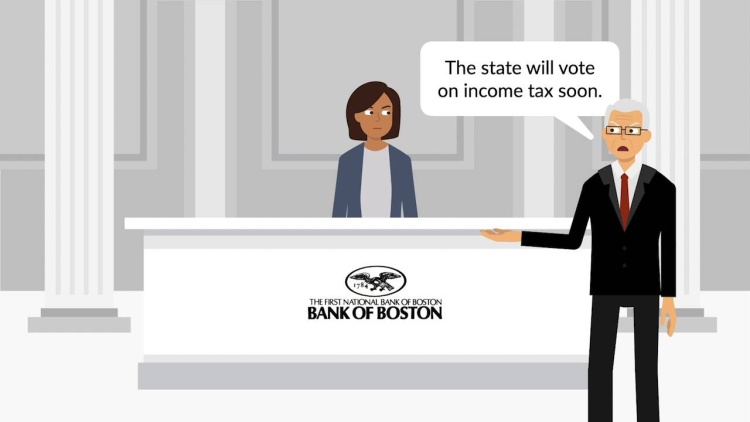First National Bank of Boston v. Bellotti
United States Supreme Court
435 U.S. 765 (1978)
- Written by Angela Patrick, JD
Facts
A Massachusetts general election included a proposed referendum to enact a graduated personal state income tax. First National Bank of Boston, two other banks, and three corporations (collectively, the entities) (plaintiffs) wished to spend money to publicize their views on the referendum before the election. However, a state criminal statute prohibited the entities from doing so. This statute generally prohibited banks and business corporations from making expenditures to influence the vote on a proposed referendum unless the proposal materially affected the entity’s property, business, or assets. The statute also specifically stated that any issue involving individual taxation—like the personal-income-tax issue in this election—would not be considered material to an entity. The entities sued Massachusetts Attorney General Francis Bellotti (defendant), alleging that the statute violated the entities’ First Amendment free-speech rights. Bellotti argued that the statute served at least two compelling government interests. First, Bellotti claimed the statute protected the individual citizen’s role in the electoral process and, therefore, a citizen’s confidence in government. Second, Bellotti claimed the statute protected the political rights of shareholders who dissented from the views of a corporation’s management. The Massachusetts Supreme Judicial Court ruled that the statute was constitutional. The entities appealed to the United States Supreme Court.
Rule of Law
Issue
Holding and Reasoning (Powell, J.)
Concurrence (Burger, C.J.)
Dissent (White, J.)
Dissent (Rehnquist, J.)
What to do next…
Here's why 907,000 law students have relied on our case briefs:
- Written by law professors and practitioners, not other law students. 47,100 briefs, keyed to 996 casebooks. Top-notch customer support.
- The right amount of information, includes the facts, issues, rule of law, holding and reasoning, and any concurrences and dissents.
- Access in your classes, works on your mobile and tablet. Massive library of related video lessons and high quality multiple-choice questions.
- Easy to use, uniform format for every case brief. Written in plain English, not in legalese. Our briefs summarize and simplify; they don’t just repeat the court’s language.





